A Guide on the Best Skincare for Pregnancy
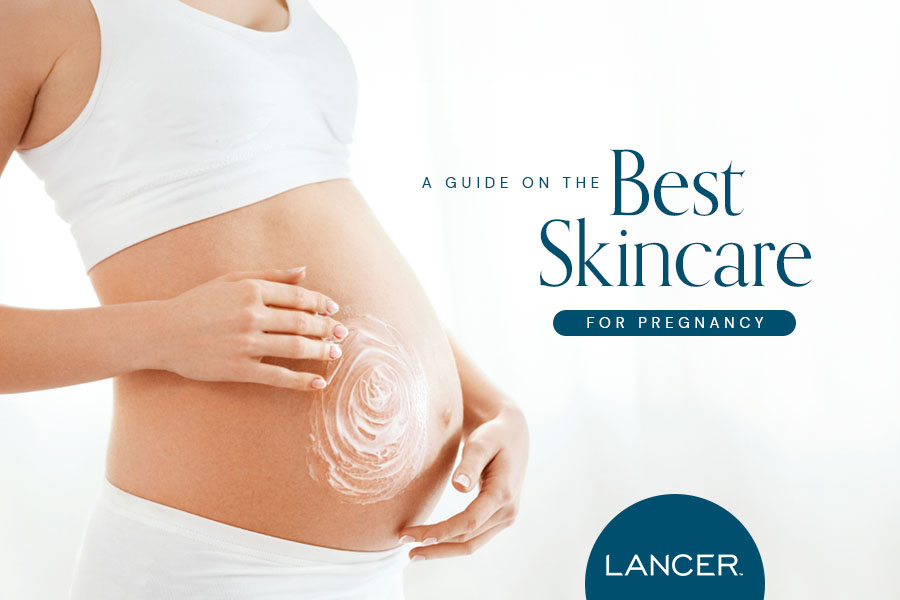
Since you will experience a lot of changes in your skin during pregnancy, figuring out a safe routine can be a lot to navigate at once. In this guide, we’ll talk about how pregnancy changes your skin and what ingredients to either use or avoid during pregnancy to help you put together a new skincare set.
How Pregnancy Changes Your Skin
Your body undergoes many changes during pregnancy, and you will almost certainly see some changes in your skin as you progress from trimester to trimester. Pregnancy causes increased blood flow and oil production, which can cause a pregnancy glow for some people and increased acne in others. Changes in hormone levels can also contribute to the development of cystic acne, even if you didn’t have acne before your pregnancy. While there are many treatments available for acne, not all of them are safe for use in pregnancy. In the upcoming sections, we’ll talk about what ingredients to avoid and what acne products you can use during pregnancy.
Your skin’s melanin production also increases during pregnancy, which can result in the development of dark spots, especially on the face. Some people develop dark patches on their nose and cheeks, a.k.a., the mask of pregnancy. You may also develop dark spots on other areas of your body as well, although the face is the most common location for dark spots to appear. Similar to the acne products, many dark spot removers are not safe to be used during pregnancy. We’ll talk more about prevention and treatment tips for dark spots in a later section.
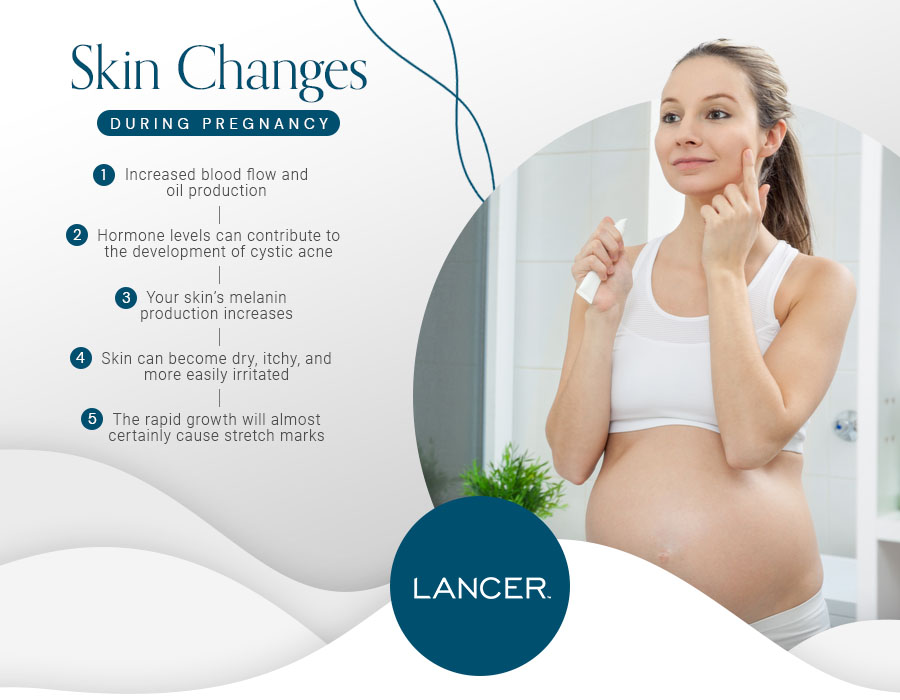
Some people also find that their skin becomes dry, itchy, and more easily irritated during their pregnancy, especially during the winter. This can eventually lead to a rash or itchy bumps appearing, especially if you don’t take preventative care of the dry patches when they first appear. It’s a good idea to regularly inspect your skin for signs of irritation, and to get in a regular moisturization routine if you find your skin becoming more dry during pregnancy.
The rapid growth in later trimesters will almost certainly cause stretch marks to appear on your belly, breast, bottom, and thighs. While many creams claim to prevent developing stretch marks, at this time these claims are unproven. Fortunately, most stretch marks will fade overtime after you give birth. If you find that your stretch marks make your skin feel irritated, applying a moisturizer can soothe them in the meantime.
Your blood volume and flow increases during pregnancy, which can make your veins more apparent. Spider veins are tiny red or purple veins that can appear anywhere on the body, especially on the face, neck, and arms. Varicose veins are larger and appear as swollen blue veins; they may also be sore or painful to the touch. Varicose veins occur because the extra weight of the uterus compresses the veins in the lower body, decreasing blood flow. Spider veins and varicose veins typically disappear on their own after you give birth and your blood volume decreases back to normal.
Find Your 3-Step Skincare Method
Skincare Ingredients to Avoid During Pregnancy
Many doctors and dermatologists recommend avoiding certain ingredients during pregnancy due to the possibility of absorbing them through your skin and passing them onto the developing fetus. While many of the studies that have been done focus on orally consuming large doses, as opposed to topically applying the ingredients, it’s still a good idea to avoid them until more research is done just to be on the safe side.
Retinol and retinoids are the first ingredients that pregnant people should avoid. This includes all vitamin A derivatives. Oral retinoids, such as Accutane, are also to be avoided during pregnancy.
Hydroquinone, which is used to lighten dark spots, is another ingredient you should avoid during pregnancy. You used to be able to get it over the counter, but now it is available by prescription only in the U.S., so it’s not as easy to accidentally buy something with hydroquinone as it used to be.
In order to reduce your chances of developing dark spots during pregnancy and prevent any current dark spots from getting worse, you should avoid the sun when possible, especially when the rays are strongest between the hours of 10 a.m. and 4 p.m. You should also protect your skin using a wide-brim hat and UPF clothing and apply sunscreen to any exposed patches.
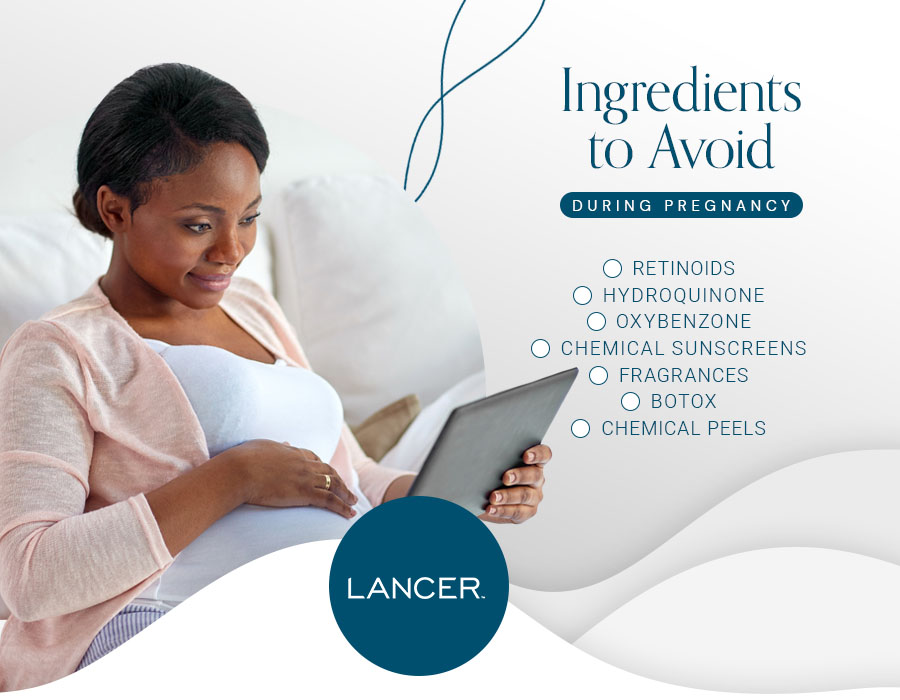
Speaking of sunscreen, you should avoid the sunscreen filter oxybenzone while pregnant, since it may increase the risk of certain effects. Some doctors advise avoiding chemical sunscreens completely, as not much research has been done on using them during pregnancy. Some people also find that chemical sunscreens are more sensitizing and irritate their skin during pregnancy. For that reason, many pregnant people prefer to use mineral sunscreens during pregnancy so that they don’t have to worry about possible risks or irritation.
Many doctors also recommend avoiding skin care products with fragrance in them during pregnancy. Many pregnant people are more sensitive to smells due to increased hormone levels, especially during the first trimester when morning sickness is at its height, and smelly skin care products can sometimes be triggering. Some people also find that fragrant components can irritate their already sensitive skin. But there’s nothing dangerous about using fragrant skin care products during pregnancy; so if you’re currently using one and it’s not bothering you, there’s no need to switch.
Many cosmetic procedures also need to be avoided during pregnancy. You should not get any treatments such as Botox, fillers, lasers, or chemical peels during your pregnancy. You may be able to get a facial done once a month, but you should talk to your OB/GYN before you book any appointments. Extensive heat therapy and any machine that involves an electrical current are also no-nos during pregnancy.
What to Look For in Skincare for Pregnancy
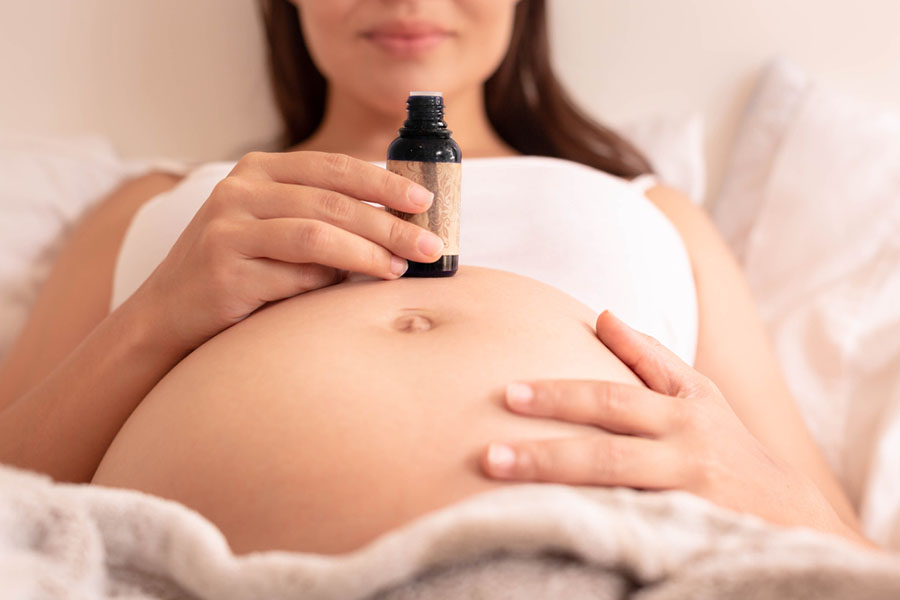
Now that we’ve talked about what skin care products you need to avoid, it’s time to focus on what skincare products you can use during pregnancy! While there are multiple ingredients you need to avoid, there are also plenty of other ingredients that you can safely use during pregnancy, especially at low concentrations. And with more cutting edge ingredients being introduced every year, you have more options than ever to choose from.
First, let’s talk about addressing acne during pregnancy. Using low concentrations of either benzo, peroxide, or salicylic acid in a face wash is usually safe for pregnancy. This will keep too much of either ingredient from being absorbed, which can be a risk when you apply a leave-on treatment with a high concentration.
You can also use small concentrations of alpha hydroxy acids, such as glycolic acid and lactic acid. These have bigger molecules than salicylic acid, and thus are less likely to be absorbed by the skin. However, since your skin does tend to be more irritated in pregnancy, it’s still a good idea to avoid high concentrations of these exfoliants. See our guide that explains how to exfoliate your face for more information.
You can also apply vitamin C topically during your pregnancy. This antioxidant has brightening effects, helping to even out your skin tone and potentially prevent or lighten existing dark patches. That being said, the most potent form of vitamin C, ascorbic acid, can be irritating to the skin when used in high concentrations. Fortunately, there are many gentle derivatives of vitamin C available so you will almost certainly be able to find one that will work for your skin during your pregnancy. For instance, our Overnight Brightening Mask features tetrahexyldecyl ascorbate (THD) to help fade the appearance of dark spots and improve your overall complexion.
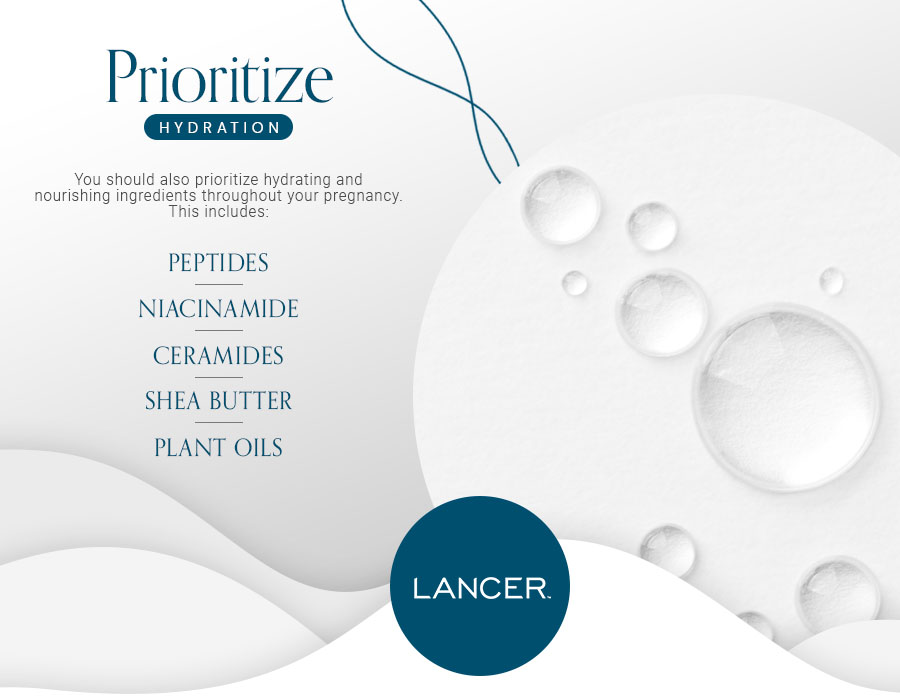
You should also prioritize hydrating and nourishing ingredients throughout your pregnancy. This includes peptides, niacinamide, ceramides, shea butter, and various plant oils and antioxidants. These ingredients will help to treat any irritation or sensitivity that you are experiencing during your pregnancy and help you maintain a glowing, but not greasy complexion. You should also drink plenty of water to make sure that your body is hydrated from the inside out as well as the outside in.
We already talked about sunscreen in the previous section, but it’s so important it bears repeating twice. You should absolutely be applying sunscreen every single morning, even if all you are doing is sitting inside. And if you are going outside, then you should be reapplying the sunscreen every two hours to protect your skin. Our Mineral Sun Shield Universal Tint is a non-chemical sunscreen that relies on zinc oxide for sun protection, making it safe to use during pregnancy. The sheer lightweight formula absorbs quickly, and it won’t make your skin feel greasy or slide around on it.
If you find that your face in particular is more oily during pregnancy, then using a gel cleanser can help to remove excess oil and help you start with a clean canvas. You might also want to switch from heavier creams to lighter lotions, especially during the day while you are out and about. Using oil-blotting sheets can help you control your shine with a quick touchup during the day, and they are completely safe to use during pregnancy. Check out our collection of skincare for oily skin to see our top Lancer skincare picks for managing oil production.
It’s also really important to establish a good body care routine during pregnancy, if you don’t already have one. That’s because the skin on your body produces way less oil than the skin on your face, and many people find the skin on their body getting dry and irritated during pregnancy, even if their face is producing more oil.
Use a gentle fragrance-free body wash that leaves your skin feeling clean, but not stripped. To seal in the moisture, apply lotion to damp skin before even getting out of the shower. If you are struggling with specific skin issues, such as eczema and rashes, talk to your doctor about topical treatments for these that are safe to use during pregnancy.

We hope this guide helps you feel more confident and informed about putting together a pregnancy-safe skincare routine as you enter this exciting period of your life! Of course, we recommend always asking your doctor before using new products while pregnant. At Lancer Skincare, we sell many products that can be used during pregnancy to help you achieve a glowing complexion.
All of our products come with a 30-day money-back guarantee so that you can shop online with peace of mind and exchange or return anything that doesn’t work for your skin during pregnancy. All of our products also shipped free within the continental United States, no order minimum necessary, to make your shopping experience a breeze.
Image Credits
Mars Brashok/Shutterstock.com
And-One/Shutterstock.com
Inna Dodor/Shutterstock.com
Ground Picture/Shutterstock.com
christinarosepix/Shutterstock.com
 PREVIOUS (A Guide to Skincare Devices)
PREVIOUS (A Guide to Skincare Devices) NEXT (What Is Gravityl? Everything You Need to ...)
NEXT (What Is Gravityl? Everything You Need to ...)